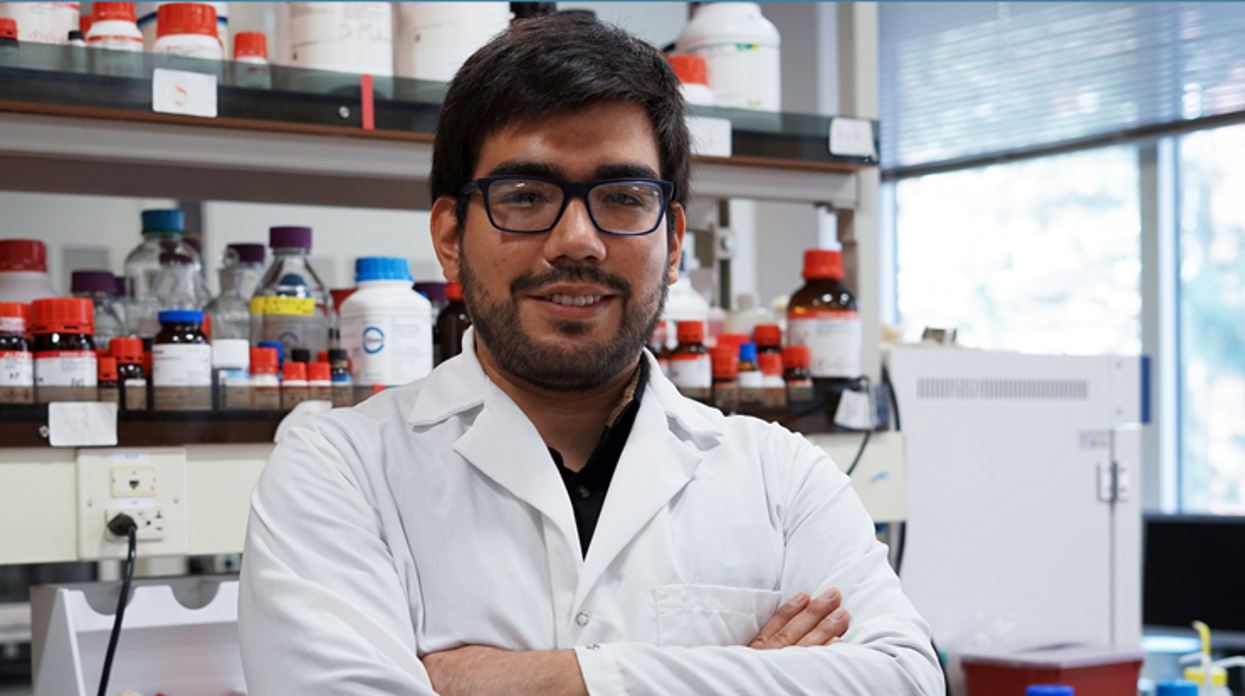
Drug Hunter is Motivated to Help Patients

Jose Mauricio Paredes Quiroz, MS ’22, works in industry to discover and develop a new type of medicine.
Jose Mauricio Paredes Quiroz, MS ’22, discovered his calling in high school. He loved learning about molecules, and he was drawn to the idea of helping humanity. So he set out to become a drug hunter.
Paredes recently achieved his goal, landing a dream job as a medicinal chemist at Dicerna Pharmaceuticals in Lexington, MA. He now works in one of the most exciting areas of drug discovery and development: RNA-based therapeutics. Massachusetts College of Pharmacy and Health Sciences (MCPHS) prepared him for the challenge of working on a new type of medicine.
Paredes first learned about MCPHS as an undergraduate in Peru. The Catholic University of Santa Maria, where he was studying chemistry, has a long-standing collaboration with MCPHS to offer a pharmacology internship in Boston. He completed the internship and later returned to MCPHS for a Master of Science in Medicinal Chemistry degree.
The nuances of molecules fascinate Paredes. His favorite class at MCPHS was Drug Metabolism.
“In the class, you see how small changes in chemistry have effects on the pharmacology of the drug,” he explained. “You need to know chemistry, but you also need to know a little bit of biology to understand what is happening in the body.”
Paredes completed his master’s degree in two and a half years, the only student in his cohort to do so. He completely immersed himself in the MCPHS experience and even met his fiancé at the University.
Paredes opted to pursue a research project on Alzheimer’s disease with his mentor, Associate Dean of Graduate Studies and Professor of Medicinal Chemistry Ronny Priefer, PhD. In patients with Alzheimer’s disease, abnormal clumps of protein pieces form plaques in the brain. Dr. Priefer studies these plaques. One goal of the research community is to disrupt the plaques. Paredes worked toward this objective with libraries of compounds inspired by natural products, which are molecules produced by living organisms.
He was conducting experiments with the compounds in a lab on campus when COVID-19 hit. He switched gears, pivoting to a computer-based project. Instead of testing compounds in plates and Petri dishes, he used computer models to put them through their paces. And he found some promising starting points for medicines.
“On his own, he learned how to model everything,” Dr. Priefer said. “I give him full credit because he took the initiative, and he worked at it, and he had some good outcomes.”
After graduation, Paredes quickly found the Resource Associate job at Dicerna Pharmaceuticals. He is now training compounds called small interfering RNAs to disrupt disease. Specifically, he is tweaking potential medicines to improve them.
“I feel ready for this job,” Paredes said. “I’m directly applying what I learned from 90 percent of the courses that I took at MCPHS.”
More University News
‘We Were Instant Friends’: From White Coats to Wedding Vows
For MCPHS Manchester alumni Megan and Joel Brown, pharmacy school sparked a love story that came full circle on campus.
Driving Acupuncture Forward: NESA Dean Tapped for Top Accreditation Role
Dr. Dennis Moseman brings decades of experience to shape national acupuncture educational standards.
This is MCPHS: ‘Everybody Here is Like a Family’
An accelerated PharmD student finds confidence, connection, and her place in Manchester.
Pharmacy in the Family: How a Professor Followed Father’s Path to MCPHS
Growing up, Dr. Kaelen Dunican lived above her dad’s pharmacy. She went on to attend and become an interprofessional education leader at his alma mater.

